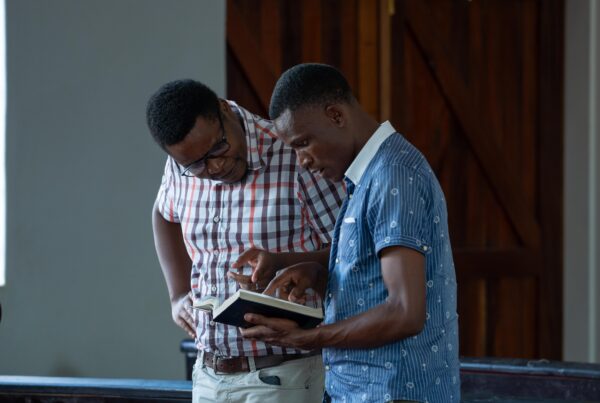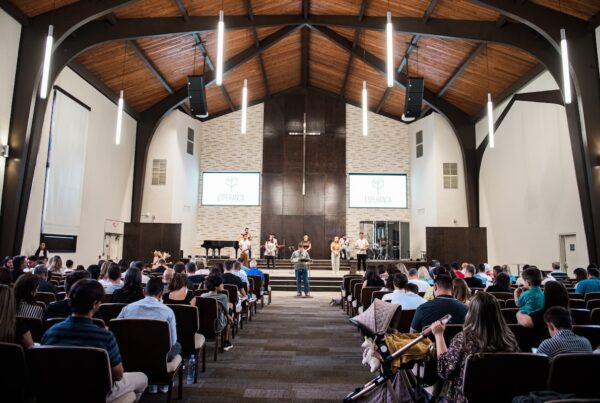I spent the first three weeks of my sabbatical building a 16×10 shed in my backyard. I enjoy working with my hands and building things, but this project was necessitated by the fact that I was on sabbatical and have two full-time pastors that office in a cabin on our property. I knew I needed a quiet space, a retreat of sorts, but I didn’t realize that God was guiding me into solitude.
The first time I sat in the new shed, disconnected from the outside world, I was startled by the number of times I reached for my phone. But it was in this space—every morning for an hour, sometimes two, with no cell phone, WiFi, or music—that God opened to me the profound simplicity of Jesus withdrawing to desolate places to pray.
As my sabbatical draws to a close, it’s hard to quantify what has changed during this time. It’s something that cannot be measured or entered into a spreadsheet; there’s simply a peace and confidence that wasn’t there before. In a ministry culture defined by an often untenable pace of performance and service, Scripture calls us to an unhurried holiness, to withdraw with Jesus to desolate places.
“Great crowds gathered to hear him and to be healed of their infirmities. But he would withdraw to desolate places to pray” (Luke 5:15–16).
The Cost of Solitude
Throughout Luke’s Gospel, we see there were people to heal, ministry to accomplish, and miracles to perform. Doing so would’ve strengthened Jesus’s message and the call to repentance. This work was important and necessary, yet Jesus “withdrew to desolate places to pray.” We have an unhealthy estimation of our own importance when we think our deeds for God are more important than our communion with God. Click To Tweet
That solitude cost something. People showed up for healing but weren’t healed, miracles were missed, and ministry didn’t happen when Jesus withdrew. But he knew the importance of communing with God and aligning himself to his will. This unity with the Father wasn’t just a supporting role in ministry life—it was the catalyst and the power. This shared, unified, triune love drove everything Jesus did.
The Struggle for Solitude
As pastors and church leaders, we know the need for solitude functionally. It isn’t a profound, theological puzzle needing to be parsed out and studied. Yet, how often do we claim there’s no time for it? How often does our prayer life suffer because of the “demands” of ministry? There’s no time to commune with God because there are people to meet with and tasks to finish.
But if Jesus is the perfect model of faithfulness, how can we preach his words but not heed his example of ministerial health and devotion? How can we be faithful and healthy to the call of God without solitude and prayer when Jesus himself withdrew from ministry for these very things?
The Fallacy Exposed
We have an unhealthy estimation of our own importance when we think our deeds for God are more important than our communion with God. It’s absurd, but this is the functional reality in which many pastors and leaders live: too busy serving God to commune with God. Solitude is a physical representation of the reality that we’re neither the point nor the power of our ministry. Click To Tweet
Then we wonder why we live in a Christian culture experiencing a pandemic of pastoral failure, disqualification, burn-out, and depression. Outwardly “successful” pastors are inwardly struggling to believe the very gospel they proclaim. It’s not a question of, “will they fall into sin?” but, “when and to what degree?”
The Relationship of Primary Importance
We need not only look to Jesus but at Jesus. We must look at how he found rest, peace, and power for the unimaginable ministry before him. Solitude is a physical representation of the reality that we’re neither the point nor the power of our ministry. What is of primary importance to your call as a leader? It’s not your relationship with the people you lead but your relationship with the God who called you.
When you strip away the phones, computers, spreadsheets, calendars, and tasks, when you sit in silence with God, your thoughts, and your prayers, you see him working. Slowly and steadily, through silence, all the things that make you significant in people’s eyes lose their luster in the face of our Creator. In the stillness before him, we quickly learn there’s only one thing in which we can boast, and it isn’t our righteousness or accomplishments.
The Call to Intimate Relationship
In solitude, there’s no one to influence or lead—only space and time to be influenced and led—as the over-estimation of our necessity breaks down. There’s peace and power when we remember that our only hope in life and death is Jesus. We aren’t the point, yet our loving Father calls us into—first and foremost—a relationship. There’s peace and power when we remember that our only hope in life and death is Jesus. Click To Tweet
He sends us out as heralds of salvation, not through our righteousness, but through the righteousness of the only perfect human to ever live: the God who laid his life down for the salvation of all who would believe. Who found hope and power in communion with his Father, and who died to invite us into this intimate relationship.
Let us be a people who follow Jesus into a desolate place so that his power and message might not only resound from our mouths but in our hearts and lives.










